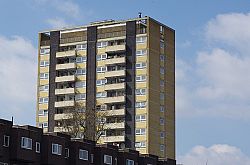

Law firm Norton Rose Fulbright has won a hugely significant cladding case on behalf of its client, Martlet Homes Limited, in what is the first High Court judgment on a claim concerning fire safety defects in cladding on a high rise building since the Grenfell Tower fire in 2017.
Martlet is part of the Hyde Housing Group, one of the largest housing associations in England, owning or managing circa 50,000 homes in London, Kent, Surrey, Sussex, Hampshire, the East of England and East Midlands.
This is a significant win not only for the Hyde Group but for many UK building owners facing similar cladding issues. It will hold wider implications for the construction industry as a whole, as well as the real estate and insurance sectors, as it offers much needed guidance on the court’s approach to numerous significant issues affecting the hundreds of cladding disputes ongoing in the UK today.
Martlet’s claim against Mulalley and Co Limited related to the defective design and installation of cladding manufactured by Sto Ltd, which was installed by Mulalley at four high rise residential towers in Portsmouth. Despite Mulalley’s wholesale denial of liability for Martlet’s losses, High Court judge HHJ Stephen Davies held that Martlet had succeeded on both its primary and alternative cases, and awarded Martlet substantial damages for the remedial works it carried out to address the defects in the cladding system.
The judge additionally awarded Martlet limited damages for the substantial costs of the waking watch service implemented by Martlet as a temporary mitigation measure for the risks posed by the cladding pending its removal.
The High Court has yet to decide what the extent of the damages will be, with the Hyde Group looking to recoup as much as much as possible of the circa £8 million the company spent on fixing the tower blocks.
Commenting on the case, Simon Ramsden, partner at Norton Rose Fulbright, said: "We’re extremely proud of the role our team played in delivering this outcome on behalf of the Hyde Group, which we hope will promote the resolution of the many cladding related disputes thanks to the court’s guidance delivered today."
Andy Hulme, CEO of the Hyde Group, believes that this case has "massive implications" for the market and should help in unblocking disputes between leaseholders living in blocks fitted with potentially flammable cladding and those buildings’ owners when it comes to who should pay to have it removed.
He said, "It’s the first time a contractor has been held accountable for the quality of work and the materials they’ve used. Based on this case, we now know where the lines of accountability lie."